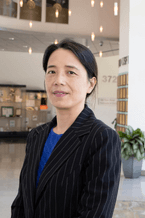Spotlight On: Lingling Fan, IEEE PES Fellow and Professor, University of South Florida
As a child growing up in a remote coastal village in east China, Institute of Electrical and Electronics Engineers (IEEE) Power & Energy Society (PES) Fellow Lingling Fan, PhD, experienced what it was like to live in a place that didn’t have the infrastructure to support electricity and clean water and where people had to work extremely hard to earn a living. This had a profound impact on her, and eventually led her to pursue a career as an engineer with a focus on power systems.
“Traditional thinking is that engineering was formidable and boring for females, but I found it to be intellectually challenging and something that is very important to society,” she said. For that reason, Lingling chose electrical engineering as her major in college and applied to the best engineering school in the region – Southeast University, located in Nanjing China. The university has a long and rich history and has produced many intellectuals for modern China. A notable alumna is Dr. Chien-Shiung Wu (Chinese: 吳健雄; May 31, 1912 – February 16, 1997), one of the most influential nuclear physicists of the 20th century who was honored on a US Postal Service Commemorative Forever Stamp in 2021.
After receiving her bachelor’s and master’s degrees in electrical engineering from Southeast University, Lingling went on to earn her PhD, also in electrical engineering, from West Virginia University in Morgantown, West Virginia. She then spent six years in industry as a planning engineer for Midwest ISO in St. Paul, Minnesota.
“My industry experience helped me understand how business runs and what the top priority of industry is: reliability,” she said. “I also learned that the power grid industry works as a very close community. For example, there are many working groups consisting of members from various companies [who work] to achieve consensus on requirements.”
Lingling’s academic career began at North Dakota State University (NDSU), where she focused on machine and electronics labs and classic control. After two years at NDSU, she took a faculty position at the University of South Florida (USF), which has been since 2009.
“Teaching is [also] very intellectually challenging, and I wanted to try it,” she said. “My mother was a middle school teacher, and my father was a hydraulics engineer. My career bridges both areas: education and engineering. I try to make my teaching relevant to the practical world and my students are highly sought after in industry.”
Throughout her educational journey and professional career, PES has played a pivotal role, not just in terms of research and learning opportunities, but also in helping Lingling make connections within the industry and academia.
“As a student and a foreigner just coming to the US, I found the support PES provided to be invaluable. This is a great tradition of PES, thanks to the Power Engineering Education Committee volunteers,” she said. “PES is my professional family.”
Given the important role PES has played in her life, it was only natural for Lingling to want to give back. She became engaged in various committees, including PEEC, Power System Dynamic Performance (PSDP), and transient analysis and simulations subcommittee (TASS).
“I also volunteer for PES University [by helping] to recruit speakers for PES webinars and serve as the editor in chief for IEEE’s Electrification magazine,” she said. “The latter propels me to understand not only the power industry, but also the electric vehicle industry, [which allows me] to broaden my reach to researchers in not only PES, but also the Power Electronics Society [PELS] and the Industry Application Society [IAS] that are working on power electronics and machines.”
She continued, “Those have been important technologies of electrification. Electric vehicles depend on motor drives. Green power grids depend on inverter-based resources like wind, which require both machines and power electronics.”
Over the course of her career, there have been many highlights. Chief among them is providing a fundamental understanding of dynamic phenomena in power systems with high penetration of inverter-based resources.
“Once the technology of component-level becomes mature, wind turbines and solar PVs are put into grids. When penetrations become high, unexpected dynamics appear and control solutions are required,” she explained. “At the component design stage, the grid is usually treated as a stiff voltage source. Converter control design is based on this assumption. When wind farms are integrated, power grids have many characteristics that cannot be represented by a stiff voltage source. My research work provided a mathematical analysis of such dynamics so people can have a better understanding of those phenomena.”
As she looks back all she has accomplished and forward to all there still is to do and explore in the field of electrical engineering, Lingling’s main focus – as it has been since she decided to become an engineer – consists of conducting research relevant to the practical world, helping youngsters on career growth, and making the world a better place for others.
“I know I want to work more with PES. It’s been so beneficial to me and I want to [continue to] find ways to give back,” she said. “There are so many opportunities to connect with colleagues worldwide, learn from each other, come up with collaborations, and make friends.”


